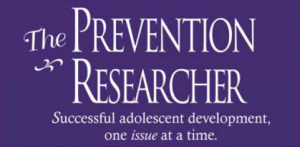 An upcoming issue of The Prevention Researcher will focus on Restorative Justice. They write:
An upcoming issue of The Prevention Researcher will focus on Restorative Justice. They write:
It has been our observation that many people are still unfamiliar with restorative justice or unsure what it means. Therefore, the goal of this issue is to introduce the topic, show what restorative justice looks likes in school and community environments, highlight the most recent research findings about its effectiveness (for the offender, victim, and community), and provide strategies for creating successful restorative justice programs and policies.
As is the style of The Prevention Researcher, articles will be chosen which work independently yet also work together to provide a balanced look at restorative justice. Given our diverse audience, this issue will examine implications for schools, families, youth, and communities. After a preliminary literature review and discussions with our Advisory and Editorial Boards, articles which are appropriate for this issue may include information on:
- The most recent research regarding the effectiveness of restorative justice
- International perspectives
- Case studies which show restorative justice in action in various environments
- The processes and/or supports that are necessary for restorative justice to be optimally beneficial to all involved (for example, what organizational policies are necessary for success)
- What, if any barriers exist to effective restorative justice
We are also looking for an introductory article to this issue. This article should introduce the topic of
restorative justice, provide definitions and highlight the most recent data and trends. Information provided
within this introductory article should include (but need not be limited to):
- Definitions of commonly used terms
- History of restorative justice
- The goals and rationale for using restorative justice
- Examples of restorative justice in various environments
- Benefits to, and impact on, the offender, the victim, and the community
If you have questions about the appropriateness of your article idea, please email Colette Kimball, Associate Editor, at CKimball (at) TPRonline.org.
Procedures for Submitting an Abstract
Authors should submit:
- An article abstract/proposal of approximately 1 to 2 double‐spaced pages, including a) a brief summary of the research and b) implications of this research for people who work with youth
- A list of key references to be cited
- Names of all authors involved and a vita of the lead author including contact information (email, phone, and mailing address).
Email abstracts, reference list, and vita to Colette Kimball, Associate Editor, at This email address is being protected from spambots. You need JavaScript enabled to view it. by March 30, 2012. Authors will be contacted by late‐April. If accepted, full manuscripts are due August 6, 2012.

